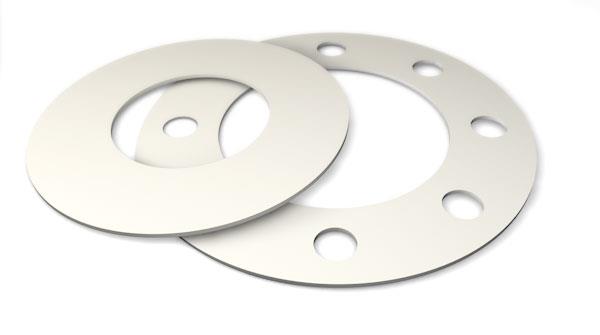Radial shaft seals with one or more PTFE sealing lip(s) are designed to withstand aggressive environments, high temperatures, high pressures and dry running that traditional radial shaft seals made of elastomeric sealing lip materials cannot withstand. Many of the PTFE compounds are FDA approved.

Main advantages of PTFE seals include:
High chemical resistanceWithstand speeds up to 30 m/s (5 900 ft/min)Wide operating temperature range, –70 to +250 °C (–95 to +480 °F)Withstand pressures up to 3,5 MPa (500 psi)Withstand dry running
The selection of seal materials typically requires a compromise between advantages and disadvantages. There are hundreds of different PTFE materials with a variety of fillers. Common fillers include glass fibre, carbon, graphite, molybdenum disulphide, metal oxides and various polymers. Each possesses different properties, appropriate for different applications and service conditions. Common to all filled PTFE materials are their improved resistance to wear and deformation.
Unfilled PTFE provides, in most cases, a lower coefficient of friction than a filled PTFE material and the lowest degree of wear of the seal counterface. However, a sealing lip made of an unfilled PTFE material has limited resistance to wear and deformation under load.
The PTFE materials that SKF most often recommends are listed in the table. In addition to PTFE-based compounds, SKF also offers radial shaft seals in other modified plastics, some of which are listed in the table.
Selecting the appropriate material for the metal case and the O-ring(s) is also of significant importance to achieving satisfactory sealing performance. Contact SKF for additional information.
Main advantages of PTFE seals include:
High chemical resistanceWithstand speeds up to 30 m/s (5 900 ft/min)Wide operating temperature range, –70 to +250 °C (–95 to +480 °F)Withstand pressures up to 3,5 MPa (500 psi)Withstand dry running
The selection of seal materials typically requires a compromise between advantages and disadvantages. There are hundreds of different PTFE materials with a variety of fillers. Common fillers include glass fibre, carbon, graphite, molybdenum disulphide, metal oxides and various polymers. Each possesses different properties, appropriate for different applications and service conditions. Common to all filled PTFE materials are their improved resistance to wear and deformation.
Unfilled PTFE provides, in most cases, a lower coefficient of friction than a filled PTFE material and the lowest degree of wear of the seal counterface. However, a sealing lip made of an unfilled PTFE material has limited resistance to wear and deformation under load.
The PTFE materials that SKF most often recommends are listed in the table. In addition to PTFE-based compounds, SKF also offers radial shaft seals in other modified plastics, some of which are listed in the table.
Selecting the appropriate material for the metal case and the O-ring(s) is also of significant importance to achieving satisfactory sealing performance. Contact SKF for additional information.
Post time: Jun-28-2020

